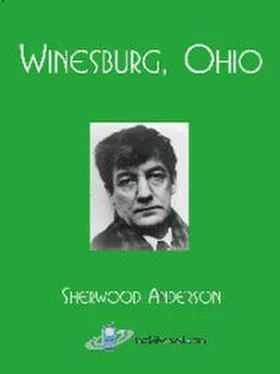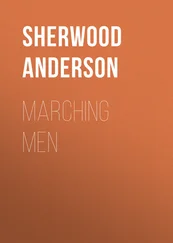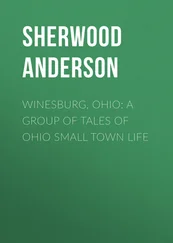Sherwood Anderson - Winesburg, Ohio
Здесь есть возможность читать онлайн «Sherwood Anderson - Winesburg, Ohio» весь текст электронной книги совершенно бесплатно (целиком полную версию без сокращений). В некоторых случаях можно слушать аудио, скачать через торрент в формате fb2 и присутствует краткое содержание. Жанр: Старинная литература, на английском языке. Описание произведения, (предисловие) а так же отзывы посетителей доступны на портале библиотеки ЛибКат.
- Название:Winesburg, Ohio
- Автор:
- Жанр:
- Год:неизвестен
- ISBN:нет данных
- Рейтинг книги:3 / 5. Голосов: 1
-
Избранное:Добавить в избранное
- Отзывы:
-
Ваша оценка:
- 60
- 1
- 2
- 3
- 4
- 5
Winesburg, Ohio: краткое содержание, описание и аннотация
Предлагаем к чтению аннотацию, описание, краткое содержание или предисловие (зависит от того, что написал сам автор книги «Winesburg, Ohio»). Если вы не нашли необходимую информацию о книге — напишите в комментариях, мы постараемся отыскать её.
Winesburg, Ohio — читать онлайн бесплатно полную книгу (весь текст) целиком
Ниже представлен текст книги, разбитый по страницам. Система сохранения места последней прочитанной страницы, позволяет с удобством читать онлайн бесплатно книгу «Winesburg, Ohio», без необходимости каждый раз заново искать на чём Вы остановились. Поставьте закладку, и сможете в любой момент перейти на страницу, на которой закончили чтение.
Интервал:
Закладка:
And then the people came along. Each as he appeared snatched up one of the truths and some who were quite strong snatched up a dozen of them.
It was the truths that made the people grotesques. The old man had quite an elaborate theory concerning the matter. It was his notion that the moment one of the people took one of the truths to himself, called it his truth, and tried to live his life by it, he became a grotesque and the truth he embraced became a falsehood.
You can see for yourself how the old man, who had spent all of his life writing and was filled with words, would write hundreds of pages concerning this matter. The subject would become so big in his mind that he himself would be in danger of becoming a grotesque. He didn't, I suppose, for the same reason that he never published the book. It was the young thing inside him that saved the old man.
Concerning the old carpenter who fixed the bed for the writer, I only mentioned him because he, like many of what are called very common people, became the nearest thing to what is understandable and lovable of all the grotesques in the writer's book.
Hands
Upon the half decayed veranda of a small frame house that stood near the edge of a ravine near the town of Winesburg, Ohio, a fat little old man walked nervously up and down. Across a long field that had been seeded for clover but that had produced only a dense crop of yellow mustard weeds, he could see the public highway along which went a wagon filled with berry pickers returning from the fields. The berry pickers, youths and maidens, laughed and shouted boisterously. A boy clad in a blue shirt leaped from the wagon and attempted to drag after him one of the maidens, who screamed and protested shrilly. The feet of the boy in the road kicked up a cloud of dust that floated across the face of the departing sun. Over the long field came a thin girlish voice. "Oh, you Wing Biddlebaum, comb your hair, it's falling into your eyes," commanded the voice to the man, who was bald and whose nervous little hands fiddled about the bare white forehead as though arranging a mass of tangled locks.
Wing Biddlebaum, forever frightened and beset by a ghostly band of doubts, did not think of himself as in any way a part of the life of the town where he had lived for twenty years. Among all the people of Winesburg but one had come close to him. With George Willard, son of Tom Willard, the proprietor of the New Willard House, he had formed something like a friendship. George Willard was the reporter on the Winesburg Eagle and sometimes in the evenings he walked out along the highway to Wing Biddlebaum's house. Now as the old man walked up and down on the veranda, his hands moving nervously about, he was hoping that George Willard would come and spend the evening with him. After the wagon containing the berry pickers had passed, he went across the field through the tall mustard weeds and climbing a rail fence peered anxiously along the road to the town. For a moment he stood thus, rubbing his hands together and looking up and down the road, and then, fear overcoming him, ran back to walk again upon the porch on his own house.
In the presence of George Willard, Wing Biddlebaum, who for twenty years had been the town mystery, lost something of his timidity, and his shadowy personality, submerged in a sea of doubts, came forth to look at the world. With the young reporter at his side, he ventured in the light of day into Main Street or strode up and down on the rickety front porch of his own house, talking excitedly. The voice that had been low and trembling became shrill and loud. The bent figure straightened. With a kind of wriggle, like a fish returned to the brook by the fisherman, Biddlebaum the silent began to talk, striving to put into words the ideas that had been accumulated by his mind during long years of silence.
Wing Biddlebaum talked much with his hands. The slender expressive fingers, forever active, forever striving to conceal themselves in his pockets or behind his back, came forth and became the piston rods of his machinery of expression.
The story of Wing Biddlebaum is a story of hands. Their restless activity, like unto the beating of the wings of an imprisoned bird, had given him his name. Some obscure p—t of the town had thought of it. The hands alarmed their owner. He wanted to keep them hidden away and looked with amazement at the quiet inexpressive hands of other men who worked beside him in the fields, or passed, driving sleepy teams on country roads.
When he talked to George Willard, Wing Biddlebaum closed his fists and beat with them upon a table or on the walls of his house. The action made him more comfortable. If the desire to talk came to him when the two were walking in the fields, he sought out a stump or the top board of a fence and with his hands pounding busily talked with renewed ease.
The story of Wing Biddlebaum's hands is worth a book in itself. Sympathetically set forth it would tap many strange, beautiful qualities in obscure men. It is a job for a p—t. In Winesburg the hands had attracted attention merely because of their activity. With them Wing Biddlebaum had picked as high as a hundred and forty quarts of strawberries in a day. They became his distinguishing feature, the source of his fame. Also they made more grotesque an already grotesque and elusive individuality. Winesburg was proud of the hands of Wing Biddlebaum in the same spirit in which it was proud of Banker White's new stone house and Wesley Moyer's bay stallion, Tony Tip, that had won the two-fifteen trot at the fall races in Cleveland.
As for George Willard, he had many times wanted to ask about the hands. At times an almost overwhelming curiosity had taken hold of him. He felt that there must be a reason for their strange activity and their inclination to keep hidden away and only a growing respect for Wing Biddlebaum kept him from blurting out the questions that were often in his mind.
Once he had been on the point of asking. The two were walking in the fields on a summer afternoon and had stopped to sit upon a grassy bank. All afternoon Wing Biddlebaum had talked as one inspired. By a fence he had stopped and beating like a giant woodpecker upon the top board had shouted at George Willard, condemning his tendency to be too much influenced by the people about him, "You are destroying yourself," he cried. "You have the inclination to be alone and to dream and you are afraid of dreams. You want to be like others in town here. You hear them talk and you try to imitate them."
On the grassy bank Wing Biddlebaum had tried again to drive his point home. His voice became soft and reminiscent, and with a sigh of contentment he launched into a long rambling talk, speaking as one lost in a dream.
Out of the dream Wing Biddlebaum made a picture for George Willard. In the picture men lived again in a kind of pastoral golden age. Across a green open country came clean-limbed young men, some afoot, some mounted upon horses. In crowds the young men came to gather about the feet of an old man who sat beneath a tree in a tiny garden and who talked to them.
Wing Biddlebaum became wholly inspired. For once he forgot the hands. Slowly they stole forth and lay upon George Willard's shoulders. Something new and bold came into the voice that talked. "You must try to forget all you have learned," said the old man. "You must begin to dream. From this time on you must shut your ears to the roaring of the voices."
Pausing in his speech, Wing Biddlebaum looked long and earnestly at George Willard. His eyes glowed. Again he raised the hands to caress the boy and then a look of horror swept over his face.
With a convulsive movement of his body, Wing Biddlebaum sprang to his feet and thrust his hands deep into his trousers pockets. Tears came to his eyes. "I must be getting along home. I can talk no more with you," he said nervously.
Читать дальшеИнтервал:
Закладка:
Похожие книги на «Winesburg, Ohio»
Представляем Вашему вниманию похожие книги на «Winesburg, Ohio» списком для выбора. Мы отобрали схожую по названию и смыслу литературу в надежде предоставить читателям больше вариантов отыскать новые, интересные, ещё непрочитанные произведения.
Обсуждение, отзывы о книге «Winesburg, Ohio» и просто собственные мнения читателей. Оставьте ваши комментарии, напишите, что Вы думаете о произведении, его смысле или главных героях. Укажите что конкретно понравилось, а что нет, и почему Вы так считаете.












